Best Oil for Classic Cars: Top Picks for Optimal Performance
Classic cars are a unique breed of vehicles that are cherished by many car enthusiasts. These cars are not just a mode of transportation but a piece of history that deserves the best care possible. One of the most critical aspects of maintaining a classic car is using the right oil. The right oil can make a significant difference in the performance and longevity of a classic car’s engine.
When it comes to classic cars, not all oils are created equal. Classic cars have different requirements than modern cars, and their engines are not designed to handle the synthetic oils commonly used today. The best oil for classic cars is one that is specifically formulated for their unique needs.
When choosing the best oil for a classic car, there are several critical factors to consider. The first is the viscosity of the oil. Classic cars require a thicker oil than modern cars because their engines are designed differently. The second is the type of oil. Classic cars require mineral-based oils that are free from synthetic additives.
We spent hours researching and testing various oils to identify the ones that are best suited for classic cars. Our research has led us to some exciting discoveries, and we’re excited to share our findings with you. In the following sections, we’ll discuss the various factors to consider when choosing the best oil for your classic car and provide our top recommendations.
Best Oils for Classic Cars
As classic car enthusiasts, we understand the importance of using the right oil to keep your vintage vehicle running smoothly. With so many options on the market, it can be difficult to determine which oil is the best fit for your specific car. That’s why we’ve put together a list of the best oils for classic cars, taking into consideration factors such as viscosity, additives, and compatibility with older engines. Whether you’re restoring a classic muscle car or simply maintaining a vintage cruiser, we’ve got you covered with our top picks for the best oils on the market.
Lucas Oil 10679 Hot Rod -amp; Classic Car SAE 10W-30 Motor Oil – 5 Quart
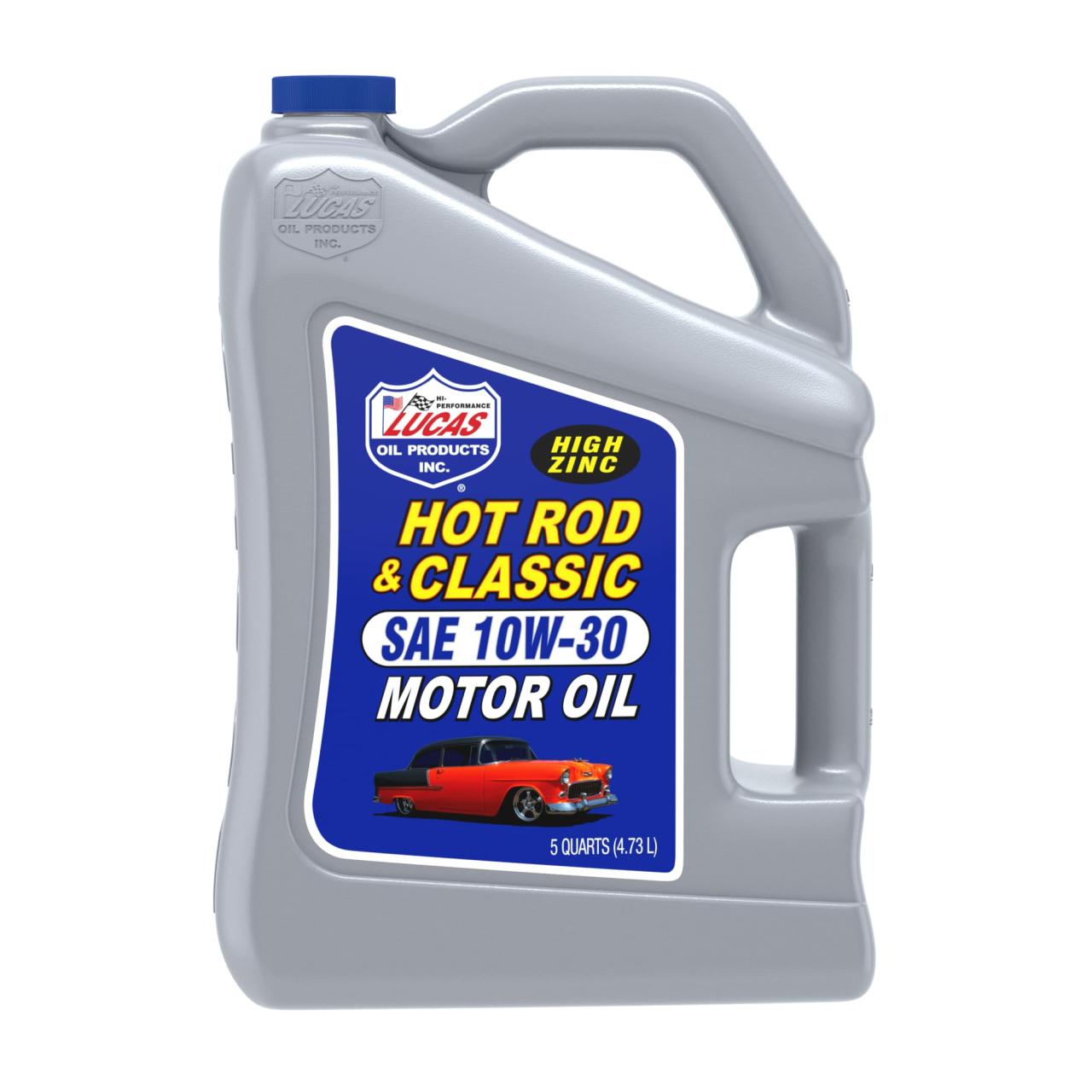
If you are looking for a motor oil that provides unparalleled protection and performance for your classic car, Lucas Oil Hot Rod and Classic Car 10W-30 Motor Oil is the perfect choice. We highly recommend this product if you want to prolong the lifespan of critical engine components and safeguard your engine during long periods of inactivity, such as winter storage.
Pros
- Manufactured with the highest quality paraffinic base oils
- Fortified with a unique additive package containing high levels of zinc, molybdenum and phosphorus
- Provides tougher, thicker additive film for maximum protection
Cons
- May not be suitable for newer cars with catalytic converters
- Relatively expensive compared to other motor oils
- May not be readily available in all auto parts stores
We have used Lucas Oil Hot Rod and Classic Car 10W-30 Motor Oil in our classic cars and were impressed with its performance. The oil improves film strength between the cylinder wall and piston rings, reducing oil burning and ensuring optimal performance. It also works well in cold temperatures, allowing for easy starts even in chilly conditions.
One of the standout features of this oil is its compatibility with methanol and all racing fuels, as well as synthetic and non-synthetic oils. It also prevents rust and corrosion, and stands up to high operating temperatures. We found that it keeps the engine running smoothly and efficiently, even in demanding conditions.
Overall, if you are looking for a motor oil that provides excellent protection and performance for your classic car, we highly recommend Lucas Oil Hot Rod and Classic Car 10W-30 Motor Oil.
Castrol GTX Classic 20W-50 Conventional Motor Oil
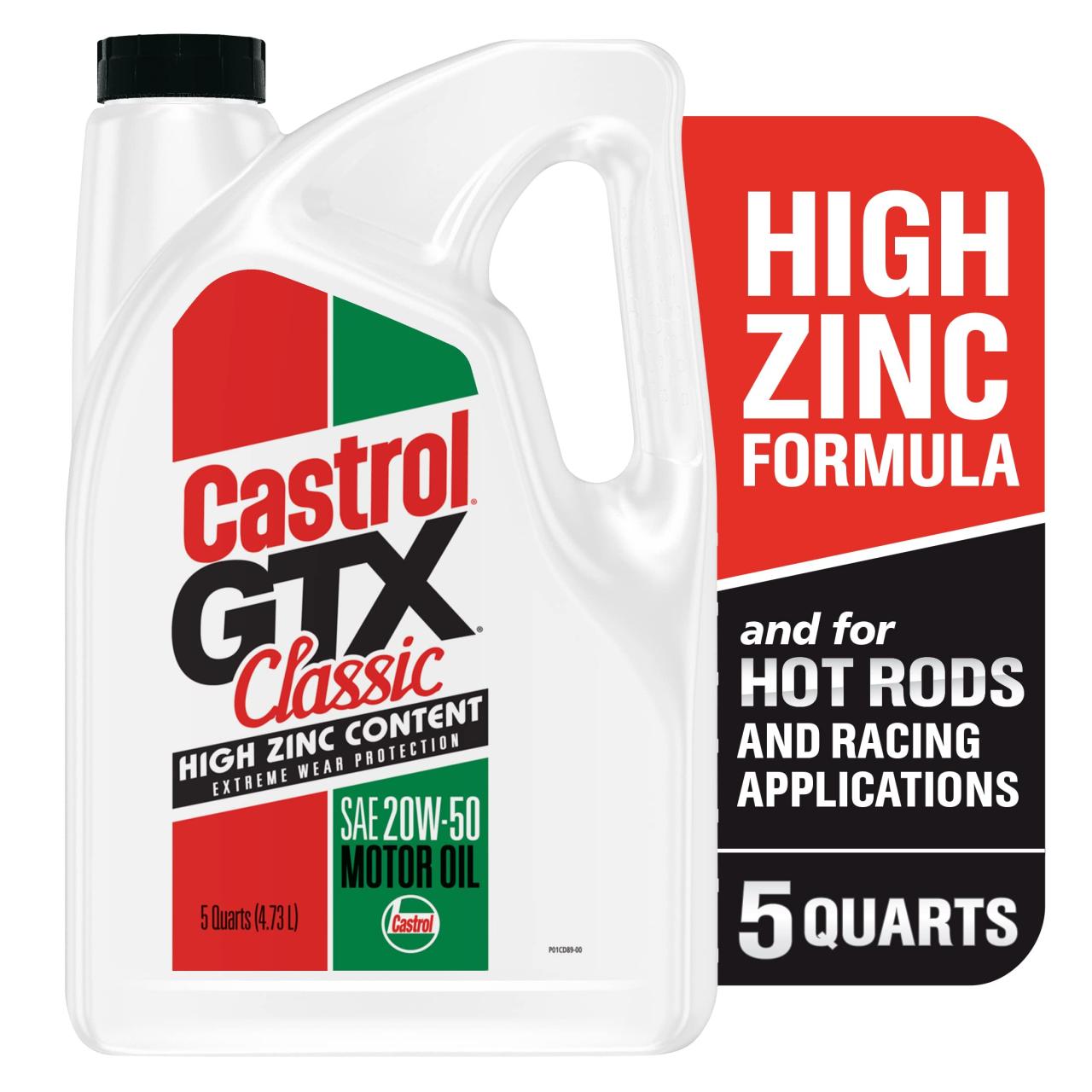
If you’re looking for an engine oil that’s specifically formulated for classic and collector cars, muscle cars, hot rods, and race cars, then Castrol GTX Classic 20W-50 Conventional Motor Oil is worth considering.
Pros
- The specialized additives containing high Zinc (1400 PPM Max) and Phosphorus offer extreme wear protection, which is particularly important for engines with high tension valve springs or performance modifications that create high contact pressure and extreme internal temperatures.
- The formulation maintains a tough and thick oil film even under severe conditions, thanks to its high resistance to thermal degradation and minimal foaming.
- It’s compatible with gasoline and alcohol-based fuels, making it a versatile choice for a range of classic cars.
Cons
- This oil is not suitable for use in modern engines with catalytic converters or wet clutch applications.
- It may not be the best choice for colder climates, as it’s a 20W-50 viscosity oil.
- Some users may prefer a synthetic oil for their classic cars, as they offer longer-lasting protection and better performance in extreme temperatures.
In our experience, Castrol GTX Classic 20W-50 Conventional Motor Oil is a reliable and effective choice for classic car owners who want to protect their engines from premature aging, wear, and metal fatigue. Its high Zinc and Phosphorus content offer excellent wear protection, while its formulation ensures a tough and thick oil film even under severe conditions. If you’re looking for a specialized oil that’s designed for classic and collector cars, then Castrol GTX Classic 20W-50 Conventional Motor Oil is definitely worth considering.
Lucas Oil 10683 Hot Rod -amp; Classic Car SAE 10W-40 Motor Oil – 5 Quart
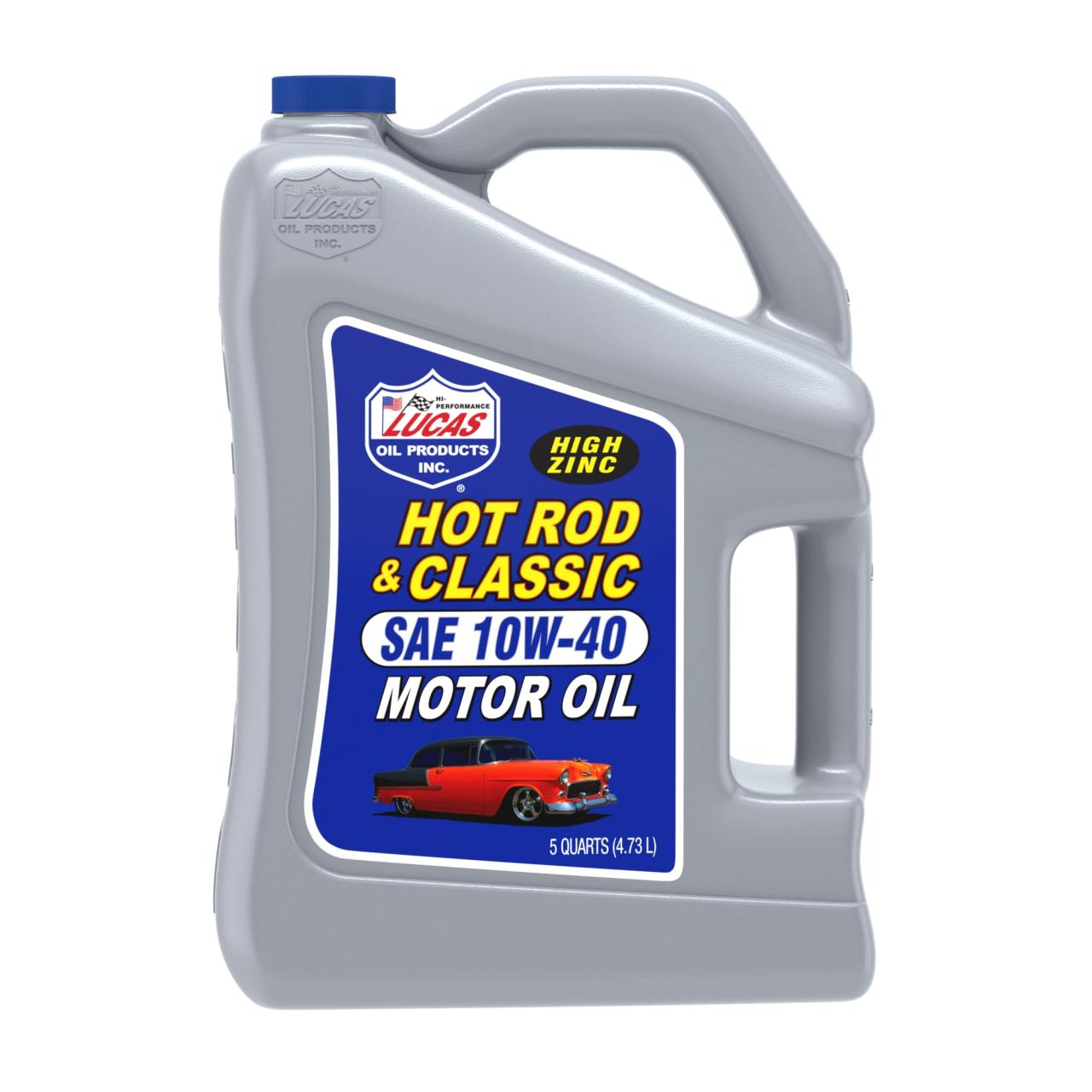
If you’re looking for a motor oil that provides maximum protection and rust and corrosion resistance for your classic car, Lucas Oil Hot Rod -amp; Classic Car 10W-40 Motor Oil is an excellent option. We highly recommend this product for its unique formula, which includes high levels of zinc, molybdenum, and phosphorous, ensuring optimal engine performance.
Pros
- Specially formulated for muscle, showroom, classic, and trophy cars without catalytic converters
- Provides maximum engine protection with rust and corrosion resistance
- Improves oil pressure in worn engines for optimal engine performance
Cons
- Not suitable for cars with catalytic converters
- Some users reported oil leaks after using this product
- Slightly expensive compared to other motor oils
Lucas Oil Hot Rod -amp; Classic Car 10W-40 Motor Oil is manufactured with top-quality paraffinic base oils and fortified with a unique additive package containing high levels of zinc, molybdenum, and phosphorous for maximum protection. It also has good cold temperature properties and can withstand high operating temperatures, ensuring a smooth and efficient driving experience.
The unique formula includes rust and corrosion protection, making it compatible with methanol and all racing fuels, as well as synthetic and non-synthetic oils. It is backward compatible with all old and new engines using Ultra Low Sulfur Diesel. The extended drain intervals mean less frequent oil changes, saving your maintenance time.
In conclusion, Lucas Oil Hot Rod -amp; Classic Car 10W-40 Motor Oil is an excellent choice for classic car owners looking for maximum engine protection and improved performance. Its unique formula ensures cool and quiet operation, providing a smooth and efficient driving experience. We highly recommend this product for its quality and effectiveness.
Pennzoil Platinum High Mileage Full Synthetic 5W-30 Motor Oil
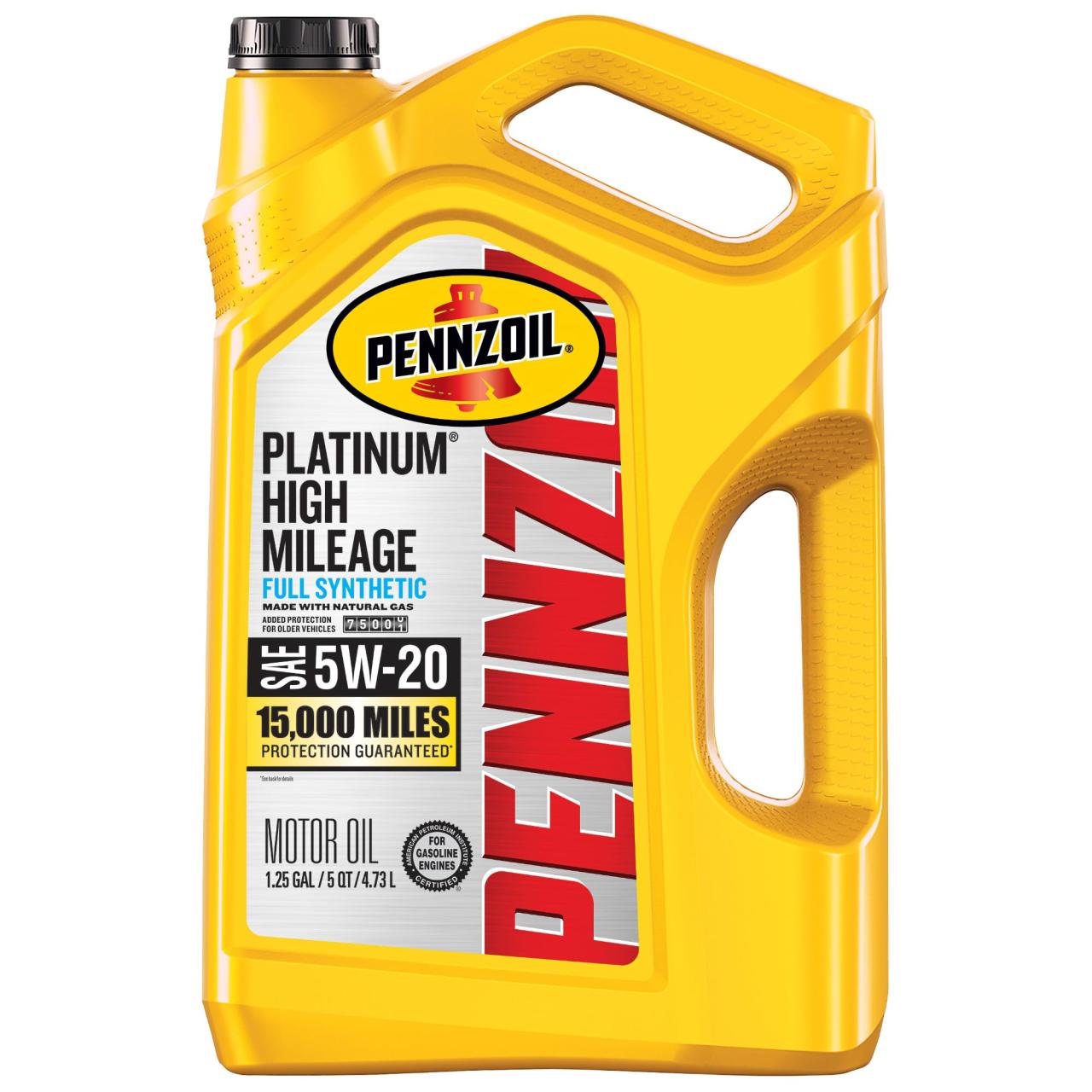
If you’re looking for an oil that can help extend the life of your classic car’s engine, then Pennzoil Platinum High Mileage Full Synthetic 5W-30 Motor Oil might be the right choice for you.
Pros
- Provides excellent wear protection for your engine and helps extend its life.
- Offers better fuel economy than many high mileage motor oils.
- Keeps pistons up to 45% cleaner than the toughest industry standard.
Cons
- Some users have reported issues with oil leaks after using this product.
- The price point is higher than many other high mileage motor oils.
- May not be suitable for all types of classic cars.
We recently tried out Pennzoil Platinum High Mileage Full Synthetic 5W-30 Motor Oil in a classic car with more than 75,000 miles on the odometer. We were impressed with the results. The oil helped to reduce oil burn off and stop leaks in the engine. We also noticed that the engine ran smoother and quieter after using this oil.
One of the standout features of this oil is its ability to protect engines from loss of horsepower. We noticed an improvement in the car’s acceleration and overall performance after using this product. It also provides excellent performance in extreme temperatures, making it a great choice for classic cars that are driven in a variety of weather conditions.
Another benefit of this oil is its ability to keep engines clean by gently lifting deposits and keeping them away from critical moving engine parts. This helps to reduce wear and tear on the engine over time, which can help to extend its life. We also appreciated the fact that it meets or exceeds OEM requirements for a variety of vehicle makes and models.
Overall, we would recommend Pennzoil Platinum High Mileage Full Synthetic 5W-30 Motor Oil to anyone looking for a high-quality oil that can help extend the life of their classic car’s engine. While it may be a bit pricier than some other high mileage motor oils, we believe that the benefits are worth the investment.
Pennzoil High Mileage Synthetic Blend 5W-20 Motor Oil
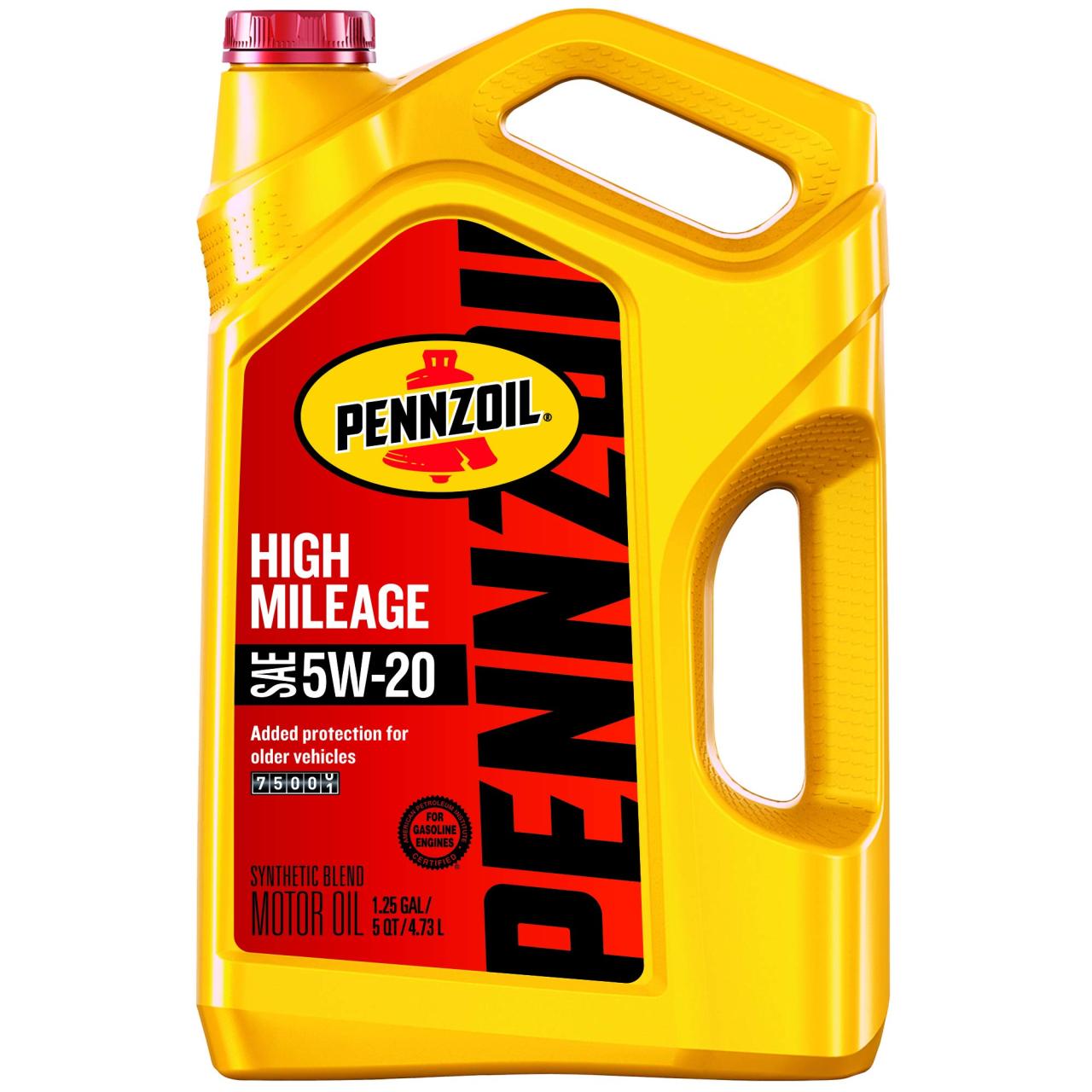
If you’re looking for a motor oil that’s specially formulated for cars with over 75,000 miles, Pennzoil High Mileage Synthetic Blend 5W-20 Motor Oil is a great option to consider.
Pros
- Provides proven wear protection for engine parts
- Helps prevent sludge and other damaging deposits
- Free warranty coverage of up to 10 years or 300,000 miles* (whichever comes first)
Cons
- May not be suitable for vehicles with less than 75,000 miles
- Some users report leaks after using the product
- May not be compatible with all types of engines
We’ve used Pennzoil High Mileage Synthetic Blend 5W-20 Motor Oil in our classic car and have been impressed with its performance. The synthetic blend formula is specially designed to help stop leaks and reduce oil consumption in older, worn engines, which is a common issue in classic cars.
One of the standout features of this motor oil is its free warranty coverage of up to 10 years or 300,000 miles, whichever comes first. This gives us peace of mind knowing that we’re covered in case anything goes wrong with our engine.
Another benefit of this motor oil is that it helps prevent sludge and other damaging deposits from building up in the engine. This can help extend the life of our classic car and keep it running smoothly for years to come.
While we’ve had a positive experience with Pennzoil High Mileage Synthetic Blend 5W-20 Motor Oil, it may not be suitable for all vehicles. Some users report leaks after using the product, and it may not be compatible with all types of engines. Additionally, it’s important to note that this motor oil is recommended for vehicles with over 75,000 miles, so it may not be the best choice for newer cars.
Overall, we would recommend Pennzoil High Mileage Synthetic Blend 5W-20 Motor Oil to anyone looking for a reliable motor oil for their classic car with over 75,000 miles. Its proven wear protection, leak-stopping formula, and free warranty coverage make it a great value for the price.
Pennzoil Platinum Full Synthetic 5W-30 Motor Oil
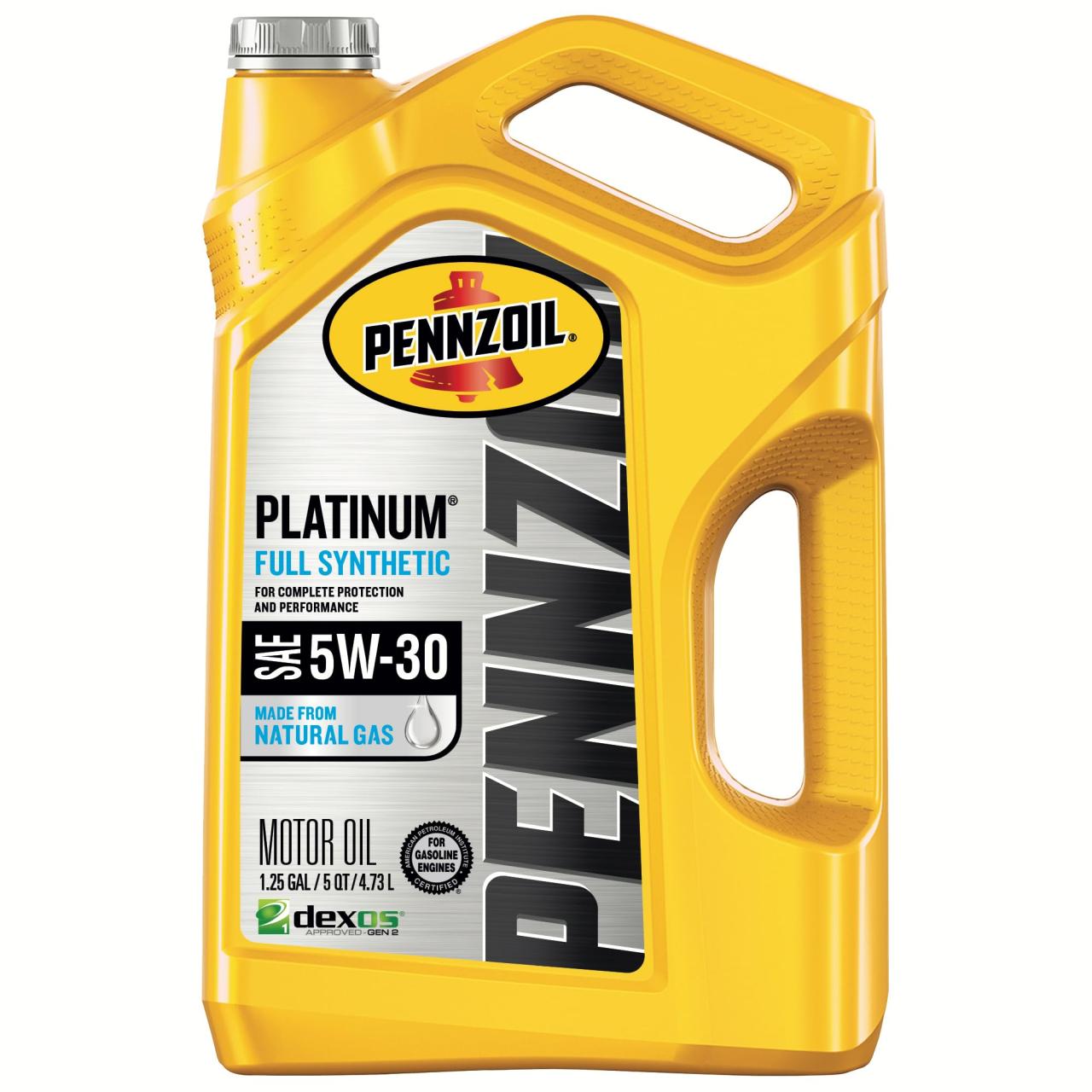
If you’re looking for a premium full synthetic motor oil for your classic car, Pennzoil Platinum Full Synthetic 5W-30 is a great choice.
Pros
- Provides complete protection for top engine performance and helps extend engine life.
- Keeps pistons up to 45% cleaner than required by industry standards.
- Provides unsurpassed wear protection and excellent performance in extreme temperatures.
Cons
- Some users report difficulty finding the product in stock.
- May be more expensive than some other motor oil options.
- The warranty requires exclusive use of Pennzoil Ultra Platinum Full Synthetic motor oil, Pennzoil Platinum Full Synthetic motor oil, Pennzoil Platinum Euro Full Synthetic motor oil, and Pennzoil Platinum High Mileage Full Synthetic motor oil.
We recently used Pennzoil Platinum Full Synthetic 5W-30 in our classic car and were impressed with the results. The motor oil provided complete protection for our engine, and we noticed improved engine performance and fuel economy. Additionally, our engine stayed clean and protected from wear and tear, even in extreme temperatures.
While the product may be more expensive than some other motor oil options, we believe the benefits are worth the investment. However, we did have some difficulty finding the product in stock, so be sure to check availability before making a purchase.
Overall, we highly recommend Pennzoil Platinum Full Synthetic 5W-30 for classic car owners looking for a premium motor oil option that provides complete engine protection and improved performance.
Castrol Edge 5W-30 Advanced Full Synthetic Motor Oil
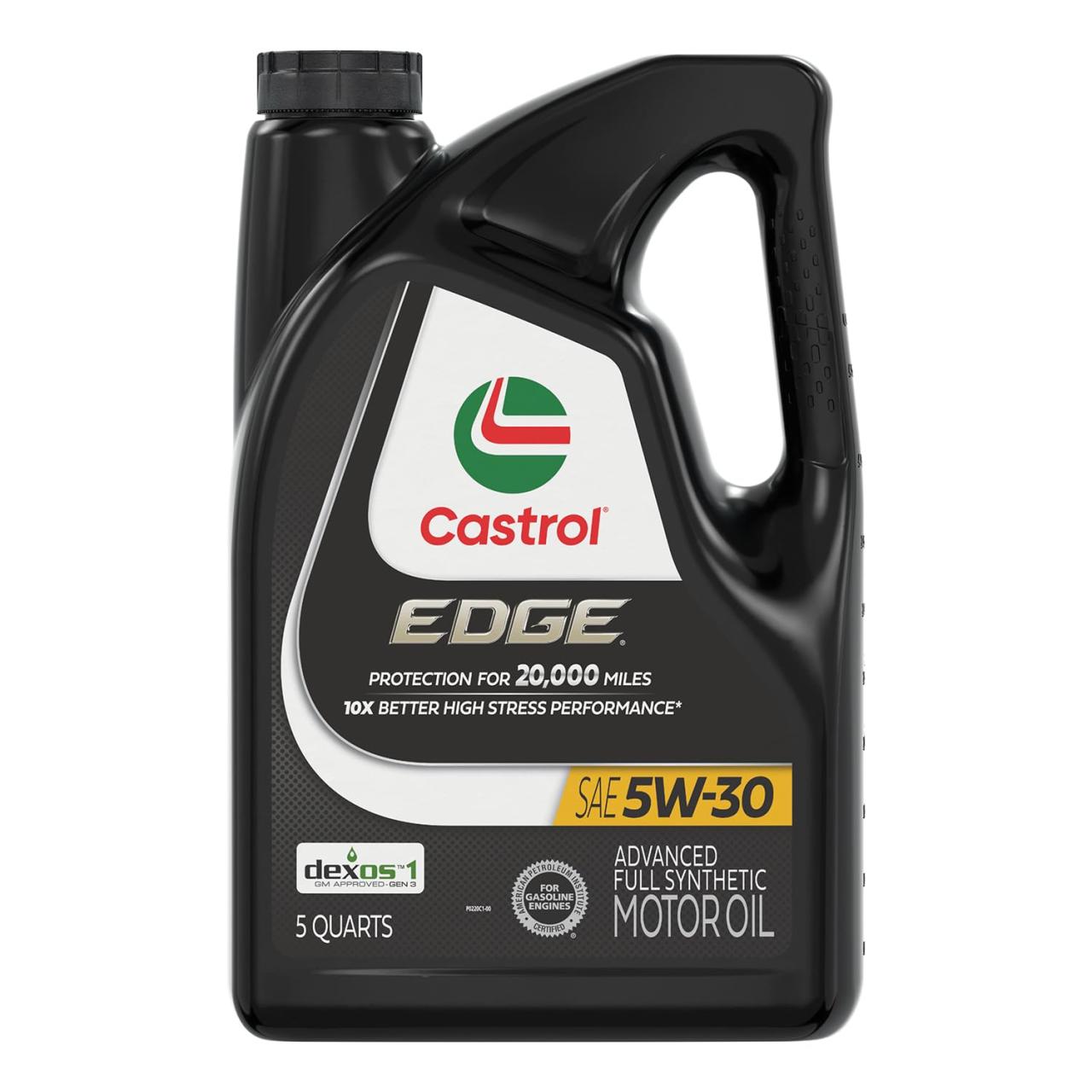
If you want the best performance from your classic car, Castrol Edge 5W-30 Advanced Full Synthetic Motor Oil is the way to go.
Pros
- With fluid titanium technology, it’s 3X stronger against viscosity breakdown than leading full synthetic oils, based on Kurt Orbahn test in 5W-30 grade.
- It provides 10X better high temperature performance, as measured in Sequence IIIH engine test vs. API SP test limit.
- It gives 6X better wear protection.
Cons
- It’s relatively expensive compared to other motor oils in the market.
- It’s not suitable for cars that require a higher viscosity rating.
- It might not be available in some local stores.
We recently used Castrol Edge 5W-30 Advanced Full Synthetic Motor Oil in our classic car and were impressed with the results. Our engine was noticeably smoother and quieter, and we experienced improved fuel economy. The fluid titanium technology provides excellent protection against viscosity breakdown, wear, and deposit control. We also appreciated that it meets ILSAC GF-6 to prevent low speed pre-ignition (LSPI) and timing chain wear protection.
One of the downsides of this oil is that it’s relatively expensive compared to other motor oils in the market. It’s also not suitable for cars that require a higher viscosity rating. However, we believe that the benefits of using Castrol Edge 5W-30 Advanced Full Synthetic Motor Oil outweigh the cost. It’s a high-quality product that provides superior protection and performance for classic cars. Overall, we highly recommend this oil to anyone who wants to get the most out of their classic car.
Pennzoil Synthetic Blend 5W-30 Motor Oil
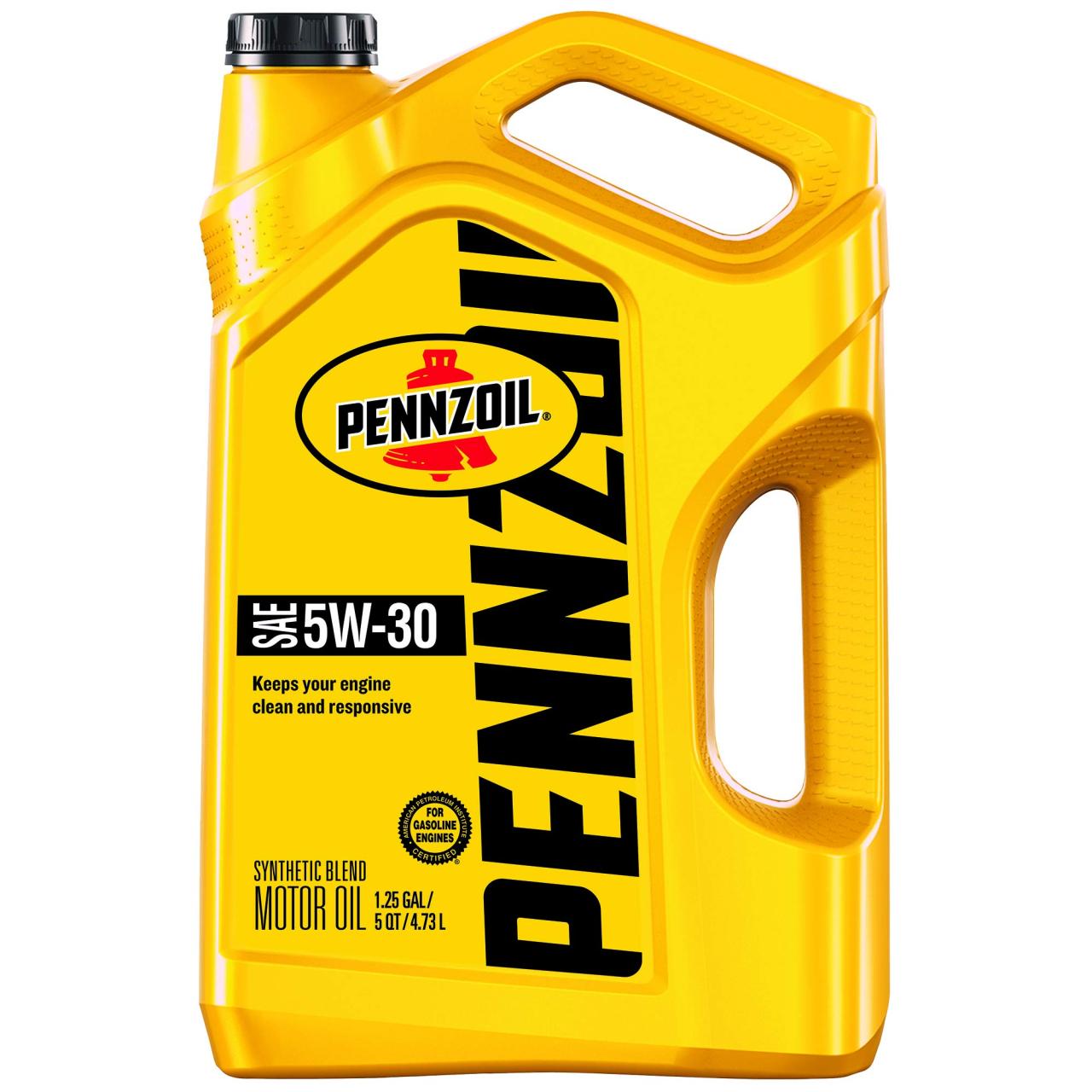
If you’re looking for a synthetic blend 5W-30 engine oil that keeps your engine clean and responsive, Pennzoil Synthetic Blend Motor Oil is a great choice. Here are some pros and cons to consider:
Pros
- Provides better wear protection than other synthetic blend motor oils
- Helps prevent sludge and other damaging deposits
- Comes with free warranty coverage of up to 10 years or 300,000 miles
Cons
- Some users have reported that the product arrived leaking in the packaging
- May not be suitable for vehicles that require a different viscosity
- Some users may prefer a full synthetic oil for their classic car
We recently tried Pennzoil Synthetic Blend Motor Oil in our classic car and were impressed with its performance. The Active Cleansing Technology helped keep our engine clean and responsive, and we appreciated the free warranty coverage for added peace of mind.
One thing to keep in mind is that this oil is a synthetic blend, so it may not be ideal for all classic cars. However, if your vehicle is compatible with 5W-30 viscosity and requires an ILSAC GF-6A or API SP-RC oil, Pennzoil Synthetic Blend Motor Oil is a great choice.
Overall, we would recommend Pennzoil Synthetic Blend Motor Oil for those looking for a high-quality, reliable engine oil for their classic car.
Buying Guide
When choosing the best oil for your classic car, there are a few key features that you should consider. Here are some factors to keep in mind to help you make the right decision:
Viscosity
Viscosity is a measure of an oil’s resistance to flow. It is important to choose an oil with the correct viscosity for your classic car’s engine. You can find the recommended viscosity in your car’s owner’s manual. It is important to note that using the wrong viscosity oil can lead to engine damage.
Additives
Additives are chemicals that are added to oil to improve its performance. Some common additives include detergents, dispersants, and anti-wear agents. When choosing an oil for your classic car, consider the type and amount of additives it contains. Some additives may be more beneficial for certain types of engines or driving conditions.
Synthetic vs. Conventional
There are two main types of motor oil: synthetic and conventional. Synthetic oil is made from chemical compounds and is designed to offer superior performance and protection. Conventional oil is made from crude oil and is less expensive than synthetic oil. When choosing an oil for your classic car, consider the benefits and drawbacks of each type to determine which is right for you.
Quality
Finally, when choosing an oil for your classic car, it is important to consider the quality of the product. Look for oils that meet industry standards and have been tested by reputable organizations. Choosing a high-quality oil can help ensure that your classic car’s engine stays protected and running smoothly for years to come.
By considering these factors, you can choose the best oil for your classic car and keep it running smoothly for years to come.
Frequently Asked Questions
What type of oil is recommended for high-mileage classic vehicles?
For high-mileage classic vehicles, we recommend using a high-quality conventional oil with a viscosity rating of 10W-40 or 20W-50. These oils are specially formulated to provide better wear protection and reduce oil consumption in older engines.
How does zinc content in motor oil benefit classic cars?
Zinc is an essential additive in motor oil that provides anti-wear protection to the engine’s metal components. Classic cars, especially those with flat-tappet camshafts, require higher levels of zinc to prevent premature wear and failure. Using motor oil with adequate zinc content can extend the life of the engine and reduce the risk of costly repairs.
Is synthetic oil suitable for use in vintage car engines?
While synthetic oil has many benefits, it may not be suitable for use in vintage car engines. Synthetic oils have different chemical properties than conventional oils, which can cause compatibility issues with older engine seals and gaskets. We recommend checking the owner’s manual or consulting with a trusted mechanic before using synthetic oil in a vintage car engine.
What are the advantages of using 20W50 oil in older vehicles?
20W50 oil is a popular choice for older vehicles because it provides better protection against heat and wear. This oil has a higher viscosity rating than other conventional oils, which makes it more resistant to thinning at high temperatures. Using 20W50 oil can also help reduce oil consumption and improve engine performance.
How often should oil be changed in classic automobiles?
The frequency of oil changes in classic automobiles depends on several factors, including the age of the vehicle, the type of oil used, and the driving conditions. As a general rule, we recommend changing the oil every 3,000 to 5,000 miles or every six months, whichever comes first. However, it’s always best to consult the owner’s manual or a trusted mechanic for specific recommendations.
What considerations are important when selecting oil for a classic muscle car?
When selecting oil for a classic muscle car, it’s important to consider the engine’s age, condition, and performance requirements. We recommend using a high-quality oil with a viscosity rating of 10W-40 or 20W-50, depending on the engine’s needs. It’s also important to choose an oil with adequate zinc content to protect the engine’s metal components and prevent premature wear.